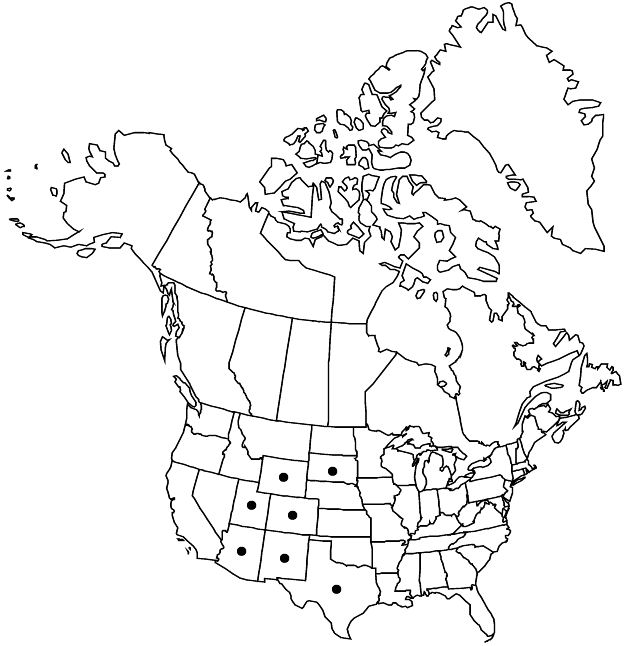Difference between revisions of "Ceanothus fendleri"
Mem. Amer. Acad. Arts, n. s. 4: 29. 1849.
FNA>Volume Importer |
FNA>Volume Importer |
||
| Line 12: | Line 12: | ||
|name=Ceanothus fendleri var. venosus | |name=Ceanothus fendleri var. venosus | ||
|authority=Trelease | |authority=Trelease | ||
| + | |rank=variety | ||
}} {{Treatment/ID/Synonym | }} {{Treatment/ID/Synonym | ||
|name=C. fendleri var. viridis | |name=C. fendleri var. viridis | ||
|authority=A. Gray ex Trelease | |authority=A. Gray ex Trelease | ||
| + | |rank=variety | ||
}} | }} | ||
|hierarchy=Rhamnaceae;Ceanothus;Ceanothus subg. Ceanothus;Ceanothus fendleri | |hierarchy=Rhamnaceae;Ceanothus;Ceanothus subg. Ceanothus;Ceanothus fendleri | ||
| Line 30: | Line 32: | ||
|elevation=1400–2700 m. | |elevation=1400–2700 m. | ||
|distribution=Ariz.;Colo.;N.Mex.;S.Dak.;Tex.;Utah;Wyo.;Mexico (Chihuahua;Coahuila;Sonora). | |distribution=Ariz.;Colo.;N.Mex.;S.Dak.;Tex.;Utah;Wyo.;Mexico (Chihuahua;Coahuila;Sonora). | ||
| − | |discussion=<p>Plants of <i>Ceanothus fendleri</i> with glabrous leaves found throughout its range have been called < | + | |discussion=<p>Plants of <i>Ceanothus fendleri</i> with glabrous leaves found throughout its range have been called <i></i>var.<i> viridis</i>. The name <i>C. fendleri</i> <i></i>var.<i> venosus</i> has been applied to plants with widely elliptic, villosulous leaf blades. Such plants are similar to C. buxifolius of northern Mexico (Chihuahua and Sonora), which has glabrous or sparsely puberulent leaf blades and ± persistent glands on denticulate leaf margins. Putative hybrids between <i>C. fendleri</i> and <i>C. herbaceus</i> in the eastern foothills of the Rocky Mountains were named C. ×subsericeus Rydberg.</p> |
|tables= | |tables= | ||
|references= | |references= | ||
| Line 39: | Line 41: | ||
-->{{#Taxon: | -->{{#Taxon: | ||
name=Ceanothus fendleri | name=Ceanothus fendleri | ||
| − | |||
|authority=A. Gray | |authority=A. Gray | ||
|rank=species | |rank=species | ||
| Line 54: | Line 55: | ||
|publication year=1849 | |publication year=1849 | ||
|special status= | |special status= | ||
| − | |source xml=https://jpend@bitbucket.org/aafc-mbb/fna-data-curation.git/src/ | + | |source xml=https://jpend@bitbucket.org/aafc-mbb/fna-data-curation.git/src/eaa6e58056e40c9ef614d8f47aea294977a1a5e9/coarse_grained_fna_xml/V12/V12_341.xml |
|genus=Ceanothus | |genus=Ceanothus | ||
|subgenus=Ceanothus subg. Ceanothus | |subgenus=Ceanothus subg. Ceanothus | ||
Revision as of 19:57, 16 December 2019
Shrubs, evergreen, 0.5–1.5 m. Stems erect, ascending, or spreading, rooting at proximal nodes; branchlets green to grayish green, thorn-tipped, round in cross section, rigid, canescent, often glaucous. Leaves: petiole 1–4 mm; blade flat, elliptic, ovate, or orbiculate, 8–25(–30) × 3–8(–14) mm, base cuneate to rounded, margins usually entire, rarely serrulate near apex, teeth 3–7, apex obtuse to rounded, abaxial surface pale green or grayish green and glaucous, appressed-villosulous to tomentulose, especially along veins, adaxial surface dark green, dull, appressed-villosulous or glabrous; 3-veined from base (lateral veins sometimes obscure). Inflorescences terminal or axillary, usually umbel-like, sometimes racemelike, 1–3.5 cm. Flowers: sepals, petals, and nectary white or pinkish. Capsules 4–6 mm wide, lobed; valves smooth to rugose, viscid, usually not crested, sometimes weakly crested.
Phenology: Flowering Jan–Jul.
Habitat: Rocky soils, slopes, open sites, chaparral, oak-pine woodlands, conifer forests.
Elevation: 1400–2700 m.
Distribution

Ariz., Colo., N.Mex., S.Dak., Tex., Utah, Wyo., Mexico (Chihuahua, Coahuila, Sonora).
Discussion
Plants of Ceanothus fendleri with glabrous leaves found throughout its range have been called var. viridis. The name C. fendleri var. venosus has been applied to plants with widely elliptic, villosulous leaf blades. Such plants are similar to C. buxifolius of northern Mexico (Chihuahua and Sonora), which has glabrous or sparsely puberulent leaf blades and ± persistent glands on denticulate leaf margins. Putative hybrids between C. fendleri and C. herbaceus in the eastern foothills of the Rocky Mountains were named C. ×subsericeus Rydberg.
Selected References
None.